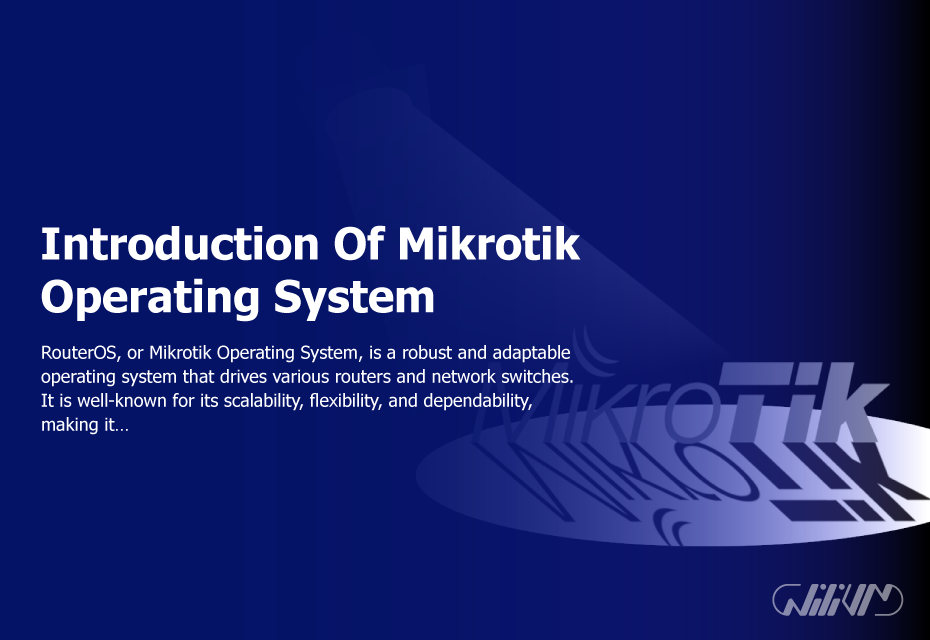Introduction Of Mikrotik Operating System
RouterOS, or Mikrotik Operating System, is a robust and adaptable operating system that drives various routers and network switches. It is well-known for its scalability, flexibility, and dependability, making it a popular option among network managers and Internet service providers (ISPs) worldwide. In this post, we’ll review the Mikrotik Operating System in detail, looking at its features, advantages, and how it operates.
What is the Mikrotik Operating System?
The Mikrotik Operating System is software that runs on network routers and switches. Mikrotik, a Latvian firm formed in 1996 that specializes in computer networking and wireless communications, created it. The Mikrotik Operating System is lightweight, quick, and efficient, making it perfect for usage in embedded devices.
TCP/IP, DHCP, DNS, NAT, and VPN are among the protocols and network services supported by the Mikrotik Operating System, which is based on the Linux kernel. It also has many functions and tools for managing and configuring network devices, such as firewall, routing, and wireless access point administration.
Features of the Mikrotik Operating System
The Mikrotik Operating System has a variety of characteristics that make it suitable for usage in small to large-scale networks. Some of the primary characteristics of the Mikrotik Operating System are as follows:
Firewall
The Mikrotik Operating System has a powerful firewall with granular control over network traffic. Administrators may use it to define firewall rules that filter traffic based on source and destination addresses, ports, protocols, and content.
Routing
RIP, OSPF, BGP, and static routing are among the routing protocols supported by the Mikrotik Operating System. It enables administrators to establish routing tables and implement policy-based routing to guarantee that network traffic is routed efficiently.
Wireless Access Point Management
The Mikrotik Operating System has a built-in wireless access point management solution that enables administrators to manage many wireless access points from a single interface. It supports 802.11a/b/g/n/ac wireless technologies and enables administrators to specify wireless security settings such as WPA/WPA2, MAC filtering, and hotspot authentication.
VPN
PPTP, L2TP/IPSec, and OpenVPN are among the VPN protocols supported by the Mikrotik Operating System. Administrators may use it to set up VPN tunnels to enable secure access to distant networks and clients.
Hotspot
The Mikrotik Operating System has an integrated hotspot management system, which enables administrators to give public internet access over wireless or wired networks. It accepts a variety of authentication methods, such as username/password, coupon, and social network login.
Benefits of Mikrotik Operating System
The Mikrotik Operating System has various advantages, making it a popular option among network managers and Internet service providers. Following are some of the main advantages of the Mikrotik Operating System:
Flexibility
The Mikrotik Operating System is very adaptable, enabling administrators to build and configure network devices to fit unique needs. It supports a variety of protocols and services, making it suitable for usage in a variety of networks.
Scalability
Since the Mikrotik Operating System is extremely scalable, administrators may add or delete network devices as the network expands. It supports a wide range of hardware platforms, including x86, ARM, MIPS, and PPC, making it simple to install on a variety of hardware devices.
Reliability
Mikrotik Operating System is very dependable, providing consistent performance and uptime. It has characteristics like failover and redundancy to ensure continuous network access.
Upgrade Your Network Today! Buy Mikrotik VPS and Maximize Your Efficiency.
Conclusion
The Mikrotik Operating System is a strong and adaptable operating system that is used to run numerous routers and switches throughout the globe. It has a plethora of features and advantages, making it a popular option among network managers and ISPs. Its adaptability, scalability, and dependability make it suitable for usage in a wide range of networks, from tiny residential networks to large-scale business networks.
Whether you are a network administrator, an ISP, or the owner of a small company, the Mikrotik Operating System may assist you in building and managing your network more quickly and effectively. Its user-friendly interface, extensive functionality, and dependable performance make it an invaluable addition to any network.
FAQs
What are the key features of Mikrotik Operating System?
Mikrotik Operating System comes with a wide range of features, including firewall, routing, wireless access point management, VPN, and hotspot.
What are the benefits of Mikrotik Operating System?
Mikrotik Operating System offers numerous benefits, including flexibility, scalability, and reliability.
Can I use Mikrotik Operating System in my home network?
Yes, Mikrotik Operating System can be used in small home networks as well as large-scale enterprise networks.
Where can I learn more about Mikrotik Operating System?
You can learn more about Mikrotik Operating System on the official Mikrotik website or through online forums and communities dedicated to Mikrotik products.







